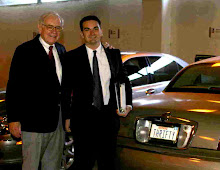Wednesday, August 12, 2009
Thursday, August 06, 2009
100% Insanity
To me, this is proof the mainstream media has absolutely no clue about economic reality.
CNN proudly boasts today that Cash For Clunkers program is “Real Stimulus,” claiming that “The boost to auto sales caused by the government trade-in program should lead to increased production from Detroit. That could have a big ripple effect.”
This whole Clunkers idea is rooted in the Keynesian logic that spending in and of itself stimulates economic growth. The logic goes that, because we built up our economy during good times and when times get rough various elements of the economy are suddenly underutilized, someone needs to fill the gap. Keynesians believe this gap should be filled by the government. What is ridiculous about this idea is that the government cannot produce any wealth, it can merely reallocate it. In order to fill this gap it must either tax its citizens or borrow. No new wealth is created through either process.
While Keynesian stimulus is clearly ridiculous, a lot of people believe it. So let’s say, just for the moment, that government spending is economically stimulative. All Cash For Clunkers will do is to pull demand forward a period or so. All those people who were driving vehicles that would need to be replaced in one or two years will replace them now. What happens in one or two years? Lower auto sales because fewer people are replacing their clunkers! This results in the same overcapacity a few years down the road that the stimulus was designed to fill today. The moral of this story is simple: the government can treat the symptoms, but it cannot cure the disease.
People can easily define their wealth on an individual level. I own a house, a car, furniture etc and all these things have value because they are useful. Therefore my wealth is defined as the cumulative value of all these useful things I own less the claims others have on them (read: debt). But when we expand this to the national level people seem to have trouble understanding.
American wealth is all the stuff we own, collectively, that has value. So when the government destroys things that have value, like cars worth less than $4500, this destroys wealth. The guy who sold his $2000 car to the government for $4500 may indeed by $2500 wealthier, but this wealth had to come from somewhere. (While the government can create money out of thin air, it cannot create wealth out of thin air.) In this case, because $2000 in wealth was actually destroyed, the full $4500 will come from everybody that doesn't sell their car to the government. The rest of the population doesn’t notice this personal wealth loss because it is either too small when spread throughout the economy or it hasn’t even happened yet and will eventually be borne by future generations.
This wealth destruction is particularly pronounced when the government doesn’t have the $4500 in its pocket that it needs to purchase the vehicle that it plans to destroy, because this means the purchase will have to be financed with borrowing. Because the national debt is already unmanageable, eventually this $4500 debt will be monetized by printing new money to repay it (a process that, incidentally, has already begun). This causes inflation, which lowers the wealth of everyone that owns dollars.
So I guess the only conclusion I can draw from this nonsense is that our elected leaders and the majority of our population continue to behave like children. Listen carefully: Americans already have too much debt. The last thing the government should be doing is encouraging them to take on even more, while simultaneously taking on more itself!
But alas, humans aren’t long-run thinking for the most part, so it shouldn’t be a surprise that the reaction to economic crisis is to lessen the pain in the short term at the expense of long term prosperity. And that, clearly, is why the Clunkers program has been praised by just about everyone that hasn’t really thought it through. Just as someone apparently has defined “stimulus” as government spending concentrated over a short period of time, they have defined “success” of the Clunkers program by the program’s ability to concentrate car sales in a short period of time. Congrats guys. You did it. I hope your grandchildren can forgive you.
Saturday, August 01, 2009
Cash For Clunkers
Let’s encourage everybody with a particular asset that has value - namely a car worth less than $4500 - to sell it to the government so the government can then destroy it. The government will finance the purchase of this soon-to-be destroyed asset with money borrowed from foreign investors (since it doesn’t have any money of its own and seems unconcerned with the prospect of exponentially rising levels of debt). Then, after the asset is destroyed, the remnants of it will be shipped abroad in the form of scrap metal, so that foreign manufacturers can re-form this metal in to a new valuable asset that Americans will be more than eager to purchase with money they still don’t have.
Yeah, that should work.

